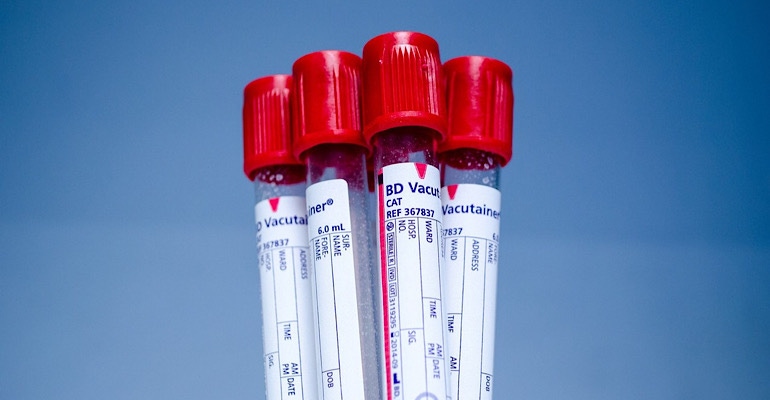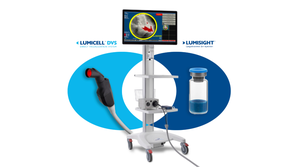A guide to reducing waste in the medical device industry by using labels.
April 25, 2023

Like many other industries around the world, the medical device industry currently creates large amounts of waste. Fortunately, there are ways to counter this, and one of the simplest ways to combat the medical device waste problem is through better labels. This article will explore how modern labeling methods can be used to make the medical device industry less wasteful.
Explanation of Labeling and Its Importance in the Industry
Labeling plays a critical role in the medical device industry, where accurate and clear labeling can help reduce waste, improve inventory management, enhance sustainability, and promote patient safety. In this article, we will explore the importance of labeling in the industry and how it can contribute to waste reduction.
Labeling is the process of attaching information to a medical device to provide instructions for use, identify the device, and convey safety information. Labels may include text, symbols, or images and are an essential component of medical device safety and effectiveness.
Medical device manufacturers must comply with strict labeling regulations to ensure patient safety, reduce the risk of errors, and minimize waste. Labels must be accurate, clear, and accessible, and they must provide essential information to healthcare providers and patients.
A Brief Overview of the Problem of Waste
The medical device industry generates a significant amount of waste, including expired, unused, or defective devices. Improper disposal of medical devices can have a negative impact on the environment, human health, and public safety.
Statistics show that medical devices are a source of a very large amounts of waste all around the world, as many have to be disposed of after a single use. Plus, due to the contaminated or toxic nature of many devices, the method of disposal has to be very precise; oversight and mistakes can put people and whole ecosystems in serious jeopardy.
Fortunately, change is afoot in the medical world, and medical institutions are making strides to become greener and reduce the amount of waste that they produce. One of the best methods to aid in this is efficient labeling, and this guide will show how smart labeling practices and modern, permanent labels can help to cut down on medical waste.
Labeling for Improved Inventory Management
One of the primary benefits of accurate labeling is improved inventory management. Healthcare providers can use labeling to track medical devices and ensure that they are used before they expire. Accurate labeling can help prevent the waste of expired or unused devices, which can be costly and contribute to environmental damage.
Importance of Accurate Labeling for Tracking Inventory
Accurate labeling is critical for tracking medical devices throughout the supply chain. Proper labeling can help healthcare providers identify and locate devices quickly, ensuring that they are available when needed. Accurate labeling can also help prevent device shortages or overstocking, both of which can contribute to waste.
One of the most immediate and impactful ways in which labels can help out in the medical world is through inventory management. By attaching permanent labels to medical devices and products, it's much easier for hospitals, clinics, and other institutions to keep track of exactly which devices they have and in what quantities.
Benefits of Improved Inventory Management, Including Reducing Waste From Expired or Unused Devices
Improved inventory management through accurate labeling can help reduce waste by ensuring that medical devices are used before they expire. Healthcare providers can also use labeling to track device usage, identifying devices that are underutilized or unused. This can help prevent waste and ensure that devices are available when needed.
This can make a massive difference in regard to waste, as it reduces the risk of products going to waste. Hospitals with poor inventory management sometimes over-order items that they don’t need or end up throwing devices away without even using them because they passed the expiry date.
If we can improve inventory management in these locations, there will be far fewer devices being thrown out and far fewer cases of hospitals ordering too much of any single item.
Labeling for Improved Sustainability
The medical device industry is increasingly focused on sustainability, and labeling can play an essential role in this effort. Sustainable labeling materials can help reduce waste and minimize the environmental impact of the industry.
Another way in which labeling can affect sustainability and waste levels from medical devices is through the usage of more sustainable materials. Many traditional labels are made in unsustainable ways or make use of materials and production practices that are simply not eco-friendly.
Not only that, but weak, adhesive labels can peel away over time, leaving medical practitioners and healthcare providers without the information they need for the devices and products they want to use. If a doctor or nurse picks up a device without any label on it, they might have no other choice but to throw it away, as they can’t be sure on how or when it should be used.
All of this can lead to lots of unnecessary waste, but smarter labeling solutions like permanent, fused labels, can help to solve the problem. Advanced fusion labeling methods are much more sustainable, producing far less waste in both their production and application.
Plus, since these labels are truly permanent and won’t fade or peel away over time, healthcare providers can rely on them to provide long-term, reliable information about how to use a product, its expiry date, how it should be disposed of, and other important data.
Use Of Sustainable Materials in Labeling And Packaging
Sustainable labeling materials, such as biodegradable or recyclable materials, can help reduce waste and promote environmental sustainability. The use of sustainable materials in packaging and labeling can help the medical device industry reduce its carbon footprint and minimize waste.
Sustainable labeling and packaging materials can help reduce the environmental impact of waste from the medical device industry. By using materials that can be recycled or biodegraded, healthcare providers can reduce the amount of waste that ends up in landfills. Sustainable labeling materials can also help healthcare providers meet their sustainability goals and demonstrate their commitment to sustainability.
Use Of Clear Labeling to Help Healthcare Providers Make Informed Decisions About Device Disposal
Clear labeling can help healthcare providers make informed decisions about device disposal. Labels can provide information on how to properly dispose of medical devices, including information on recycling or other sustainable disposal methods. By providing clear instructions healthcare providers can avoid improper disposal, which can lead to environmental pollution and contamination.
Labeling for Improved Patient Safety
Labeling plays a critical role in promoting patient safety in the medical device industry. Clear and accurate labeling can help healthcare providers identify the proper device for use, understand proper device handling, and reduce the risk of errors or adverse events.
One of the reasons why labels are so important in the world of healthcare is because they provide important information about how each device or product should be used. Healthcare providers often rely on these labels to tell products apart and find out exactly how to use or dispose of them.
Use of Labeling to Communicate Proper Device Usage And Handling to Healthcare Providers
Labels can provide essential information on proper device usage and handling, reducing the risk of errors or adverse events. Labels can include information on device sterilization, storage, and use, ensuring that healthcare providers understand the proper use of medical devices.
Additionally, labeling can provide information about device compatibility and contraindications, helping healthcare providers select the appropriate device for a particular patient. This can reduce the risk of adverse events and complications, as well as unnecessary device usage and waste.
To be effective, labeling must be clear, accurate, and consistent. Manufacturers should carefully consider the needs of healthcare providers when designing labeling, taking into account the context in which devices will be used and the specific information that is most important for ensuring safe and effective use.
Importance Of Accurate Labeling For Avoiding Errors And Reducing Device Recalls
Accurate labeling is crucial for avoiding errors and reducing device recalls in the medical device industry. A mistake on a label can have severe consequences for patients and healthcare providers alike. For example, if a label indicates incorrect usage instructions, a patient may use the device incorrectly and suffer harm. Similarly, if a label lists incorrect materials or components, it can lead to allergic reactions or other adverse effects.
Inaccurate labeling can also lead to device recalls, which can be costly and damaging to a company's reputation. A recall may be necessary if a device is found to have a defect that could cause harm to patients, and accurate labeling can help to identify potentially affected devices and minimize the scope of the recall.
To prevent errors and device recalls, medical device companies must ensure that their labeling is accurate and up-to-date. This may involve working closely with regulatory agencies to ensure that labeling meets all necessary requirements, as well as implementing rigorous quality control procedures to catch any errors or inconsistencies in labeling before it is printed and distributed. By prioritizing accurate labeling, medical device companies can help to ensure patient safety and avoid costly recalls.
It’s vital for labels to provide this information in an accurate and reliable manner. If the labels aren’t clear, fade over time, peel away, or fail to effectively communicate relevant information regarding proper product usage and handling, healthcare providers are more likely to make mistakes that could lead to serious medical errors and even endanger patient lives.
This should result not only in fewer errors and a reduced risk of any accidents or unwanted injuries for patients or personnel but also helps to ensure that every device is used to its full effect. This can, in turn, help to make each healthcare institution more efficient, with better device usage, fewer product recalls, and less waste as a result.
Conclusion
It's clear to see that the medical world has a serious waste problem. Every day, in hospitals across the globe, medical devices and instruments are discarded. Items like gloves, needles, scalpels, and more are thrown away, and in lots of cases, these devices could have been used more efficiently or disposed of in a safer and better way.
Fortunately, as this guide has shown, there are options out there to help with this problem and reduce the amount of needless waste that medical institutions generate. Investing in smarter and better labeling solutions is an affordable and effective way to get started, and it can not only help to reduce waste but also cut down on medical errors and make healthcare providers’ lives a lot easier, too.
About the Author(s)
You May Also Like


